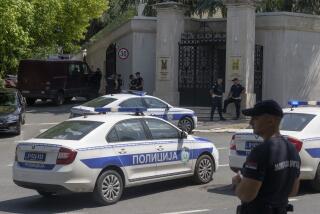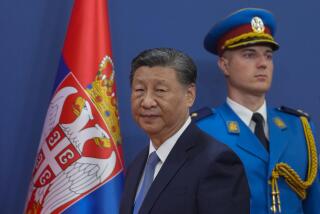CIA ‘Nominated’ Target NATO Mistakenly Hit
- Share via
WASHINGTON — Senior U.S. military and NATO planners reviewed and approved a proposal, first made by the CIA several weeks ago, that ultimately led a U.S. warplane to mistakenly bomb the Chinese Embassy in Belgrade early Saturday instead of a nearby Yugoslav military supply facility, officials said Sunday.
U.S. and NATO officials insisted that they would not stop the air war against Yugoslavia or change their strategy to end the “ethnic cleansing” in the Kosovo region, despite the escalating diplomatic and political damage this latest inadvertent bombing has caused.
Furious Chinese government officials and diplomats appeared to reject the regrets and explanations offered by top U.S. and North Atlantic Treaty Organization officials, who insist that the deadly airstrike on the embassy was a tragic mistake based on faulty intelligence. Ugly anti-American protests raged in Beijing and many other Chinese cities for a third day today.
A U.S. official said the CIA initially “nominated” the building as a target two to three weeks ago, in the mistaken belief that it housed headquarters for the Yugoslav army’s weapons supply and procurement system.
The CIA proposal then was vetted and validated by staff members of the Joint Chiefs of Staff at the Pentagon, the U.S. European Command and NATO headquarters in Brussels, in a chain of command intended to ensure that only proper targets are chosen for attack.
“This one followed that procedure,” said the official, who spoke on condition of anonymity. “It goes through a lot of different hands. At each stop, the targets are reviewed to make sure they’re appropriate and if there is anything in the area you wouldn’t want to strike--like a hospital, a school or an embassy. In this case, the building or its location was mistakenly identified.”
The official said those picking targets might have been using old maps of Belgrade, the Yugoslav capital, as the Chinese Embassy was moved in the past few years.
“Most maps show the Chinese Embassy at a different location,” he said. But he added: “We’re not all using the same map. Clearly, lots of things went wrong.”
Chinese officials said its embassy in Belgrade has occupied the building for about two years. The five-story building is several hundred yards from the Yugoslav Federal Directorate of Supply and Procurement, which NATO said was the intended target.
The Pentagon said three laser- or satellite-guided weapons slammed into the embassy, which also contained living quarters for diplomatic staff members.
In an unusual joint statement issued late Saturday, CIA Director George J. Tenet and Defense Secretary William S. Cohen said they “deeply regret” the accident. “The bombing was an error,” they said, but noted that “there is no such thing as risk-free military operations.”
They added: “It was the result of neither pilot nor mechanical error. Clearly faulty information led to a mistake in the initial targeting of this facility.”
The “extensive process” used to “select and validate” proposed targets to ensure they are appropriate military targets “did not correct this original error,” they said.
The CIA and the Pentagon have begun investigating the incident. Tenet and Cohen said that “a review of our procedures has convinced us that this was an anomaly that is unlikely to happen again. Therefore, NATO authorities intend to continue and intensify the air campaign.”
NATO Secretary-General Javier Solana also ruled out slowing the air campaign, now in its 48th day.
“The Yugoslav government has not done anything positive,” Solana said. “The only thing it is doing is to continue massacring people on the ground in Kosovo and expelling people from their houses.”
NATO officials say that only a dozen attacks have gone astray since the air campaign against Yugoslavia began March 24, and that relatively few civilians have been killed. The officials say that record stands in sharp contrast to the thousands of ethnic Albanians who have reportedly been executed by Serbian troops in Kosovo--which is a province of Serbia, Yugoslavia’s main republic--and with the hundreds of thousands of people who have been driven from their homes.
“We’ve struck at 1,900 aim points. We have dropped 9,000 pieces of ordnance, bombs or missiles. Twelve have gone astray. . . . If you look at the big picture, the overwhelming majority are landing every day and every night on their targets,” NATO spokesman Jamie Shea said in Brussels.
“Armed conflicts always bring their share of mishaps,” he added.
NATO Supreme Allied Commander Gen. Wesley K. Clark said on ABC-TV’s “This Week” that NATO has launched more than 18,000 sorties since the war began. He called the campaign “the most precise, effective and collateral-damage-free air operation that has ever been conducted.”
In other developments:
* Two political opponents of Yugoslav President Slobodan Milosevic warned the international community not to agree to any deal that would leave him in power. Milo Djukanovic, president of Yugoslavia’s smaller republic, Montenegro, and Zoran Djindjic, leader of the Serbian opposition Democratic Party, issued the appeal on the eve of intensifying diplomatic efforts to find a peaceful resolution to the conflict. “If the war ends and the same political leaders remain in power with Slobodan Milosevic at the helm, the tragedy and violence will continue,” the two warned in a statement faxed to the Reuters news agency.
* United Nations relief workers and Albanian authorities warned that an influx of 5,000 ethnic Albanian refugees who arrived in Kukes, Albania, from Kosovo on Saturday had no place to sleep, and urged them to find shelter in other refugee camps. Kukes has been overwhelmed by about 100,000 Kosovo refugees, most of them ethnic Albanian, since March. But many refuse to leave, saying they want to stay close to the Kosovo border or that they see no point in trading one refugee camp for another.
* Ethnic Albanians said by telephone from Kosovo that Serbian forces and Kosovo Liberation Army rebels were fighting in the town of Djakovica, close to the Albanian border. NATO officials said they have seen less Serbian military activity and more action in recent days by the rebel Kosovo Liberation Army, and said that it appears the insurgents have been helped by NATO bombing of Serbian troops.
* In northern Greece, local media reported that scores of demonstrators broke into a NATO communications facility at an unused army base near the port of Salonika. Public sympathy in Greece has been growing for fellow Orthodox Christians in Yugoslavia.
* Germany’s foreign minister, Joschka Fischer, said a military solution involving NATO ground troops may be required if peace cannot be achieved through diplomatic means. “We would like to find a political solution, but if necessary we will be ready to seek a military solution,” Fischer said in Sofia, Bulgaria. “We cannot accept for this part of Europe to sink in bloodshed,” he added.
* Russia’s special envoy for the Balkans, Viktor S. Chernomyrdin, insisted that the bombing of the Chinese Embassy in Belgrade had set back efforts to negotiate an end to the war. “The thing that has happened throws us far back,” he told reporters on his return to Moscow after meetings in Bonn with German leaders, U.N. officials and Kosovo Albanian political leader Ibrahim Rugova.
U.S. Deputy Secretary of State Strobe Talbott, among other diplomats, will fly to Moscow this week to try to hammer out details of a peace plan agreed to in general terms by the Group of 8 industrialized nations last week in Bonn.
NATO warplanes pounded road and rail links and knocked out TV and radio broadcast facilities in central Yugoslavia on Saturday night and Sunday morning, according to the alliance.
NATO airstrikes also hit airfields in Nis, Yugoslavia’s third-largest city, and the Kosovo provincial capital, Pristina. NATO said that unfavorable weather hampered operations but that Yugoslav artillery sites and six mortar positions were hit, as well as Serbian vehicles, troops and armor in Kosovo. Yugoslav media reported today that NATO had attacked Nis again overnight.
*
Drogin reported from Washington and Rubin from Brussels. Times staff writer Richard C. Paddock in Moscow contributed to this report.
More to Read
Sign up for Essential California
The most important California stories and recommendations in your inbox every morning.
You may occasionally receive promotional content from the Los Angeles Times.














